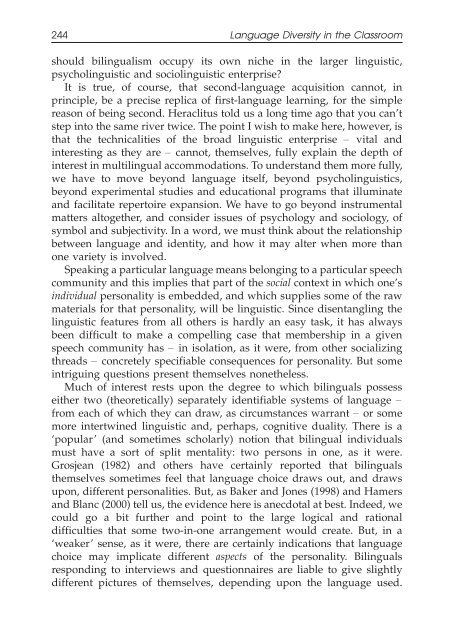Language Diversity in the Classroom - ymerleksi - home
Language Diversity in the Classroom - ymerleksi - home
Language Diversity in the Classroom - ymerleksi - home
- No tags were found...
Create successful ePaper yourself
Turn your PDF publications into a flip-book with our unique Google optimized e-Paper software.
244 <strong>Language</strong> <strong>Diversity</strong> <strong>in</strong> <strong>the</strong> <strong>Classroom</strong>should bil<strong>in</strong>gualism occupy its own niche <strong>in</strong> <strong>the</strong> larger l<strong>in</strong>guistic,psychol<strong>in</strong>guistic and sociol<strong>in</strong>guistic enterprise?It is true, of course, that second-language acquisition cannot, <strong>in</strong>pr<strong>in</strong>ciple, be a precise replica of first-language learn<strong>in</strong>g, for <strong>the</strong> simplereason of be<strong>in</strong>g second. Heraclitus told us a long time ago that you can’tstep <strong>in</strong>to <strong>the</strong> same river twice. The po<strong>in</strong>t I wish to make here, however, isthat <strong>the</strong> technicalities of <strong>the</strong> broad l<strong>in</strong>guistic enterprise vital and<strong>in</strong>terest<strong>in</strong>g as <strong>the</strong>y are cannot, <strong>the</strong>mselves, fully expla<strong>in</strong> <strong>the</strong> depth of<strong>in</strong>terest <strong>in</strong> multil<strong>in</strong>gual accommodations. To understand <strong>the</strong>m more fully,we have to move beyond language itself, beyond psychol<strong>in</strong>guistics,beyond experimental studies and educational programs that illum<strong>in</strong>ateand facilitate repertoire expansion. We have to go beyond <strong>in</strong>strumentalmatters altoge<strong>the</strong>r, and consider issues of psychology and sociology, ofsymbol and subjectivity. In a word, we must th<strong>in</strong>k about <strong>the</strong> relationshipbetween language and identity, and how it may alter when more thanone variety is <strong>in</strong>volved.Speak<strong>in</strong>g a particular language means belong<strong>in</strong>g to a particular speechcommunity and this implies that part of <strong>the</strong> social context <strong>in</strong> which one’s<strong>in</strong>dividual personality is embedded, and which supplies some of <strong>the</strong> rawmaterials for that personality, will be l<strong>in</strong>guistic. S<strong>in</strong>ce disentangl<strong>in</strong>g <strong>the</strong>l<strong>in</strong>guistic features from all o<strong>the</strong>rs is hardly an easy task, it has alwaysbeen difficult to make a compell<strong>in</strong>g case that membership <strong>in</strong> a givenspeech community has <strong>in</strong> isolation, as it were, from o<strong>the</strong>r socializ<strong>in</strong>gthreads concretely specifiable consequences for personality. But some<strong>in</strong>trigu<strong>in</strong>g questions present <strong>the</strong>mselves none<strong>the</strong>less.Much of <strong>in</strong>terest rests upon <strong>the</strong> degree to which bil<strong>in</strong>guals possessei<strong>the</strong>r two (<strong>the</strong>oretically) separately identifiable systems of language from each of which <strong>the</strong>y can draw, as circumstances warrant or somemore <strong>in</strong>tertw<strong>in</strong>ed l<strong>in</strong>guistic and, perhaps, cognitive duality. There is a‘popular’ (and sometimes scholarly) notion that bil<strong>in</strong>gual <strong>in</strong>dividualsmust have a sort of split mentality: two persons <strong>in</strong> one, as it were.Grosjean (1982) and o<strong>the</strong>rs have certa<strong>in</strong>ly reported that bil<strong>in</strong>guals<strong>the</strong>mselves sometimes feel that language choice draws out, and drawsupon, different personalities. But, as Baker and Jones (1998) and Hamersand Blanc (2000) tell us, <strong>the</strong> evidence here is anecdotal at best. Indeed, wecould go a bit fur<strong>the</strong>r and po<strong>in</strong>t to <strong>the</strong> large logical and rationaldifficulties that some two-<strong>in</strong>-one arrangement would create. But, <strong>in</strong> a‘weaker’ sense, as it were, <strong>the</strong>re are certa<strong>in</strong>ly <strong>in</strong>dications that languagechoice may implicate different aspects of <strong>the</strong> personality. Bil<strong>in</strong>gualsrespond<strong>in</strong>g to <strong>in</strong>terviews and questionnaires are liable to give slightlydifferent pictures of <strong>the</strong>mselves, depend<strong>in</strong>g upon <strong>the</strong> language used.
















